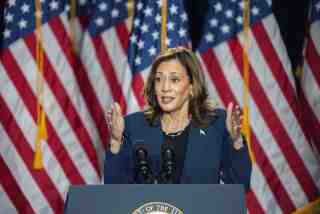Bush’s Buddy Blair Favors Kerry, So the Chatter Goes
- Share via
LONDON — At the recent Republican National Convention, First Lady Laura Bush recalled an “intense” meeting at Camp David between her husband and Tony Blair, his British ally in the campaign against Saddam Hussein. At the mention of the prime minister’s name, the delegates applauded.
So it might come as a surprise: Blair would like to see somebody else occupying the White House.
Or at least that’s the buzz in the political talking classes here. For the record, Blair has struck a strictly neutral pose. He easily deflected a reporter’s question about his preference at a news conference last week, saying that the choice of president is for the American people alone.
But in a delicate political minuet, an envoy from Blair’s left-of-center Labor Party had just been in the United States on a semiprivate visit, meeting with Democratic leaders and activists in New York. The message being delivered was that Labor’s traditional friendship with the party was intact and that Blair stood more than ready to cooperate with a Democratic administration should John F. Kerry win the November election.
At the same time, Progress magazine -- independent, but considered the favored mouthpiece of Blair’s “modernist” wing of the Labor Party -- came out with a lacerating editorial criticizing President Bush’s style and handling of the presidency and concluding that “those who recognize that American leadership is both vital, and a force for good in an uncertain world, will wish John Kerry well on 2 November.”
The piece, penned by the magazine’s editor, Robert Philpot, signaled where the Blair camp genuinely stands. It was headlined “The Real Deal.”
“I think it is fairly obvious that if Blair were to draw a personal preference, he would want Kerry to win,” John Rentoul, chief political commentator for the Independent on Sunday, said in an interview. “However, he is not going to say so.”
The advantage to Blair of a Kerry White House is obvious, said one Labor commentator close to Downing Street’s thinking. “We will have an administration in Washington that is far more in touch with the one here in London, and actually could take some of the more difficult decisions,” the source said, requesting anonymity because of Blair’s edict to appear neutral.
Support for Bush -- or lack of it -- among foreign leaders has intermittently emerged in the presidential campaign.
This year, Vice President Dick Cheney chastised Kerry for his reported comment (which later emerged to be a misquotation) that foreign leaders had told him they preferred him for the presidency. A White House spokesman went so far as to challenge Kerry to name names or else admit he had lied.
“American voters are the ones charged with determining the outcome of this election, not unnamed foreign leaders,” Cheney mocked Kerry at the time.
Even though Britain is a close U.S. ally, there are indications of great disquiet about Bush’s leadership, and a feeling that he is a political liability.
“Everyone around here is praying that Bush loses -- not least because we lose loads of votes every time he opens his mouth about his close friend Tony Blair,” said one Labor member of Parliament, who requested anonymity. “And I should say that I supported the military action in Iraq.”
Bush’s standing in Britain is low. A recent survey for the Times of London showed Britons polled preferring Kerry to Bush by a 52%-29% margin. The Labor lawmaker said Bush’s widespread unpopularity is “our Achilles’ heel” and could hurt Labor in the next general elections.
Another Labor legislator, Clive Soley, disagreed. “I don’t think it makes that much difference either way,” he said. “The perverse part is that Bush winning makes people realize that whether or not they like it, people have to adjust to the feelings in the United States, and that would be good for the political classes.”
Political journalist Andrew Grice, writing in the Independent, said that some backbenchers in Blair’s party wished the prime minister would go further to help Kerry, perhaps even by asking the Democrat to speak at Labor’s national conference, as President Clinton did in the past.
But according to Grice, Labor’s upper echelon has concluded -- especially given Bush’s upturn in U.S. polls and the recent focus on security issues -- that most Americans are reluctant to switch presidents. Any overtures to Kerry could risk burdening U.S.-British relations if Bush were reelected.
Still, Labor’s preference for the Democratic Party is unsurprising, given that Labor and the Democrats both tend to the left of the political spectrum and are often in sync on policy. Blair followed Clinton’s example to move his party toward the center in the 1990s, a shift that resulted in victory in 1997 after 18 years of Conservative Party rule. The two leaders were exceptionally close.
When Clinton left office in 2001, Blair -- reportedly at Clinton’s advice -- shifted his friendship to Bush.
Kerry need not worry about the Bush-Blair bond, however, Rentoul said. “If John Kerry wins, which he still might do, Tony Blair will be his best buddy too,” Rentoul said. “He is pretty flexible in that sense.”
Janet Stobart of The Times’ London Bureau contributed to this report.
More to Read
Get the L.A. Times Politics newsletter
Deeply reported insights into legislation, politics and policy from Sacramento, Washington and beyond. In your inbox twice per week.
You may occasionally receive promotional content from the Los Angeles Times.









